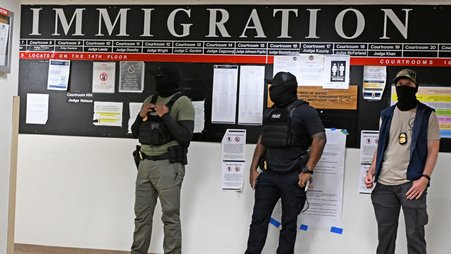This week’s much talked-about Supreme Court hearing about government pressure on social media content moderation could have huge implications for free expression online, but an overlooked exchange between one justice and a state solicitor general should be particularly worrying to journalists — or anyone who cares about press freedom.
In Murthy v. Missouri, the states of Missouri and Louisiana, along with five individual social media users, sued the Biden administration, claiming that it violated the First Amendment by allegedly coercing platforms into removing users’ speech about COVID-19 and election disinformation. The lower courts held in favor of the plaintiffs.
Most analyses of Monday’s oral argument agree, however, that the Supreme Court was skeptical of the plaintiffs’ argument that the Biden administration’s ability to communicate with the platforms in any manner should be sharply limited. At the same time, the justices seemed rightly concerned about government attempts to coerce platforms into removing users’ content — such as by threatening an antitrust action against a company that refused to comply with a removal request — which even the government’s lawyer conceded would be impermissible.
Justices’ national security concerns should concern journalists
But there was one area where at least some justices seemed more willing to permit the government to influence or even coerce publishers: protecting national security. Several justices pointed out that the government often tries to influence the press not to publish news stories that officials claim will harm national security.
That’s true. But just as true is that the press remains free to reject the officials’ requests — or even demands — not to publish. For instance, when The Washington Post published the Snowden leaks, it withheld some information — but not all — at the request of officials. If the intelligence agencies had their way, explained then-Executive Editor Marty Baron, the Post wouldn’t have published any of the Snowden documents at all.
That important limit seemed lost at some points during the court’s argument. In one particularly troubling exchange, Justice Ketanji Brown Jackson asked the lawyer for the states about whether the government could tell the platforms it must remove “classified information” posted by a user. The states’ lawyer — who was there to argue against the government’s power to demand content removals — swiftly agreed that content could be required to be removed.
That’s not right. There’s nothing about invoking the words “classified information” or “national security” that gives the government the power to forbid publication or require removal of already published information.
That was exactly the argument the Supreme Court rejected in the Pentagon Papers case, when it held that the First Amendment prohibits prior restraints — court orders censoring the publication of an article or documents — in almost all cases. As Justice Black explained, “The word ‘security’ is a broad, vague generality whose contours should not be invoked to abrogate the fundamental law embodied in the First Amendment.”
It would be incredibly dangerous for the Supreme Court to adopt an interpretation of the First Amendment in Murthy that gives the government greater leeway to coerce social media or any publisher into not publishing information on the basis of national security concerns.
Claims that the sky will fall if certain information is published rarely pan out. But that hasn’t stopped our government from invoking national security to try to stop or delay publication of information that reveals its wrongdoing. Other countries that actually have the power to censor speech online in the name of national security have abused it to prevent publication of information that’s embarrassing or exposes their own abuses.
If anything, the court should be concerned that the power imbalance already tilts too far in favor of the government when it comes to attempts to coerce publishers into withholding information on the basis of “national security concerns.”
The court has wisely barred officials from punishing journalists for publishing truthful information that they lawfully obtained, or from clawing back information, without adding in an exception for leaks the government claims would threaten national security. But in the Pentagon Papers case, several justices also suggested that the government may be able to punish the press for publishing national security secrets after the fact, and the government has never disavowed this power.
In fact, the government’s current position in the Julian Assange case is that it can prosecute publishers under the Espionage Act merely for publishing national defense information. The government has responded to concerns that Assange’s prosecution threatens press freedom by claiming the public could trust it to distinguish Assange from conventional journalists and refrain from prosecuting the latter.
We’ve never trusted the government to make that distinction — especially when half the administrations since Nixon’s have threatened to prosecute journalists. And our concerns are heightened by the revelation that at least one Supreme Court justice doesn’t see a distinction either. The threat of prosecution or censorship, whether spoken or unspoken, is already a powerfully coercive force when the government warns the press not to publish national security secrets. Jackson’s comments compound that threat.
When the government weighs in on private actors’ decisions about what to publish — whether it’s social media platforms or newspapers — it’s a delicate balance. The government should be able to share information that can inform publication decisions, but it shouldn’t be able to force a decision not to publish or to take down what’s already been published.
The Supreme Court seems on track to strike the right balance in Murthy. But if there’s one thing the court must not do, it’s create a special rule that gives the government more power to coerce publishers when it claims a national security threat.





